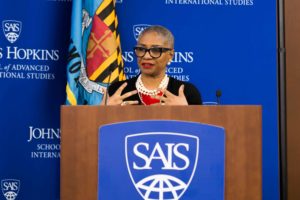April 14, 2017
The landscape of political economies across Africa continue to change as women, and other historically marginalized populations seek greater formal access to markets, state resources and power. These societal groups also work through informal institutions and structures within the state-society terrain. This conference will explore the power of gender in shaping (re)distributive priorities within the state, considering a range of implications for both local and global governance. The conference explores engagement to develop women’s capacity to influence public policies and expand the boundaries of citizenship, in the ever present and dynamic trade-off between governments’ competing priorities and group interests. While women traverse the productive and reproductive sectors and often contribute a predominant share of public resources, they are rewarded with less than a fair proportion of the surplus even as they bear a more significant portion of the adverse externalities of the market and state politics.
African economies, under conditions of economic globalization and neoliberal restructuring, saw the advance of primarily market solutions to poverty and gender inequality. More than three decades later, there is widespread agreement that the market alone lacks the capacity to address women’s economic development and empowerment issues. Significant contradictions exist between the expectations of neoliberal reform and women’s lived realities. The resultant approach of ‘bringing-the-state-back-in’ seeks a more optimal mix of price-based and policy-based interventions to confront the persistent gender gap that disproportionately affects women in the state and economic realms.
Speakers: Chimamanda Ngozi Adichie, Ambassador Hassana Alidou, Dr. Inyang Ebong-Harstrup
Panel 1: “Civil Society and Social Entrepreneurship”
1. Scholarship on civil society and women’s empowerment in Africa is beset with conflicting conclusions. While many argue that civil society has provided a valuable platform and a credible site of resistance and advocacy for gender equality and women’s empowerment, others argue that civil society has destabilized women’s role and customary rights. Overall, has civil society mobilization been a significant source of engendering policies that raise the status of women’s citizenship in Africa?
2. What are the prospects for increasing women’s spheres of influence and agency across the market and state through civil society activities?
Panelists:
- Mary Osirim, Bryn Mawr College Pennsylvania,
- Lillian Chege, CareerBox, South Africa,
- Peace Medie, Princeton University
- Panel moderator: Oge Onubogu, USIP
Panel 2: “Women’s Political Participation and Policy Making”
1. Why do gender gaps persist across policy areas within African states in spite of advancements in gender equality indicators like increased access to education for girls and adult women, health and reproductive care, political office and paid employment outside the home?
2. Given that African women have historically been marginalized in forming coalitions and alliances that shape access to power both within local and global spaces (including to political parties, pressure groups like lobbying and advocacy, etc.), how has these constraints influenced governance outcomes for women, and how might women overcome these barriers to equality in access to power?
3. What are the prospects for reducing gender equality and increasing women’s economic empowerment across the market and state through political participation?
Panelists:
- Denise Marie Walsh, University of Virginia
- Gretchen Bauer, University of Delaware
- Chiedo Nwankwor, SAIS
- Stephanie Burchard, Department of Defense
- Panel Chair: Elor Nkereuwem, SAIS
Panel 3: “Political Alliances, Governing Coalitions, and Women’s Access to Power”
1. Is it not paradoxical that while women’s electoral significance is increasing across the continent – as women often constitute a majority of voters in some countries like Nigeria, indicators measuring women’s economic status consistently lag behind their rate of electoral participation in Africa?
2. What are the prospects for increasing women’s political and economic empowerment across the market and state through building alliances and coalitions?
Panelists:
- Mojubaolu Olufunke Okome, Brooklyn College of CUNY
- Leonardo Arriola, UC Berkeley
- Kara Ellerby, University of Delaware
- Alice Kang, University of Nebraska
- Panel Chair: Josephine Dawuni, Howard University



